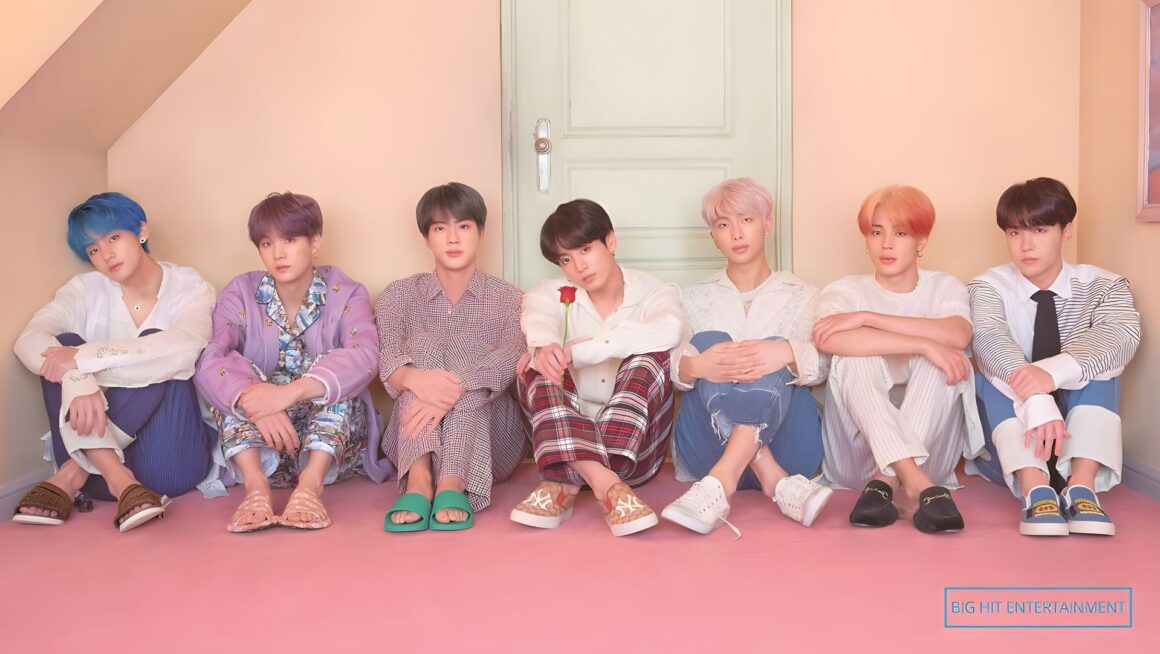BTS is arguably one of the most influential groups in music right now. The South Korean boy band has broken records and opened the doors for Korean and Asian artists to promote in the West. But who are BTS? And if you’re a new fan or a casual listener, what do you need to know about this group?
The Members

- RM (Kim Nam-joon): Leader, main rapper and one of the main songwriters/producer for BTS. Fluent in English, he’s known for his calm, intelligent personality and often translates for the members during interviews.
- Jin (Kim Seok-jin): The oldest member and one of their vocalists. Despite being a part of the hyung line, Jin isn’t afraid of showing a playful and goofy side of himself.
- Suga (Min Yoon-gi): Rapper and producer. Quiet and introspective, he uses his alter ego Agust D to discuss heavy themes through his solo work, like trauma and depression.
- j-hope (Jung Ho-seok): Rapper, main dancer, songwriter and producer. He’s known for his confidence, high-energy and vibrant personality.
- Jimin (Park Ji-min): Vocalist and main dancer. He’s famous for his cute and charismatic personality and he’s also admired for his dance skills, stage presence and unique vocal tone.
- V (Kim Tae-hyung): Vocalist with a distinct, deep voice. His quirky, mischievous personality and exotic visuals have made him popular among fans.
- Jung Kook (Jeon Jung-kook): Main vocalist, lead dancer and the youngest member. Extremely creative and talented, he’s often referred to as the “Golden Maknae” for his skills in singing, dancing, songwriting, photography and filmmaking.
The Basics
BTS was formed in 2010 by Bang Si-Hyuk, who wanted to form a group around RM, who was an underground rapper at the time. Originally, BTS was supposed to be a hip-hop group similar to Migos, but Bang decided to model BTS after a typical K-pop group by adding vocalists and focusing on complex choreography.
The group made their debut on June 13, 2013 under Big Hit Entertainment when they performed their first ever single “No More Dream” on Mnet’s M Countdown.
What Does BTS Stand For?
Their name is short for Bangtan Sonyeondan (방탄소년단), or “Bulletproof Boy Scouts” in English. According to j-hope, the name represents the group’s desire to “block out stereotypes, criticisms, and expectations that aim at adolescents like bullets, to preserve the values and ideal of today’s adolescents.”
In 2017, tried to adopt a more mature meaning behind their name by adding “Beyond the Scene,” to the acronym. The new name is supposed to symbolize growth and their willingness to push boundaries. But no one actually refers to BTS as “Beyond The Scene” and the group seems to have abandoned the new name.
Concept and Musical Style
For their initial releases, BTS’ music was rap-centric and inspired by old-school hip-hop. Their lyrics spoke against the rigid societal norms Korean teens and young adults feel pressured to adhere to.
The release of their The Most Beautiful Moment in Life and Wings albums marked a shift where the group expanded their concept and embraced different genres by incorporating pop, EDM, rock, ballads, disco, and R&B into their music. Lyrically, their songs addressed mental health, personal growth, self-love and how it influences one’s ability to experience romantic love, and the pressures of fame.
Their music often draws inspiration from literature, psychology and philosophy. They even have an elaborate alternate universe storyline known as the “BU” (BTS Universe), adding layers of depth to their artistry.
Cultural Impact & Career Achievements
BTS has been credited for popularizing Korean culture across the globe. They were also one of the first K-pop groups to use social media to promote themselves and build a fanbase. Reports estimate that BTS added over $5 billion dollars to South Korea’s economy each year and they’re seen as an important element of Korea’s soft power and international image.
And that’s barely covering how much this group has accomplished over the years. Here’s a little list of some of the awards and achievements BTS has acclimated since their debut:
- As of 2025, BTS are the best-selling musical act in South Korea, having sold over 44 million albums.
- They’re also the most awarded artist in South Korean history, and have won 67 Daesangs (grand prize; the top honor to receive during an awards show)
- In 2020, they became the first Korean artist in history to top the Billboard Hot 100 chart with their English single “Dynamite”.
- Their 2020 single “Life Goes On” is also the first Korean language song to top the Hot 100 months later.
- In 2018, Love Yourself: Tear made them the first Korean group to top the Billboard 200 albums chart in the US.
- They also scored six No. 1 singles on the Billboard Hot 100, including “Dynamite,” “Butter,” and “Permission to Dance”. They’re the fastest act to achieve this feat since The Beatles.
- They also became the fastest group since The Beatles to achieve four US number-one albums in less than two years.
- They have the most music show wins among Korean artists; they’ve earned 164 wins since 2015.
- Their Map of the Soul: 7 album is the fourth best-selling album of all time in South Korea, and the first to exceed 4 million, and later 5 million sales.
- They’re the first Korean pop act to be nominated for a Grammy and the first Korean group to be nominated for a Brit Award.
- BTS have won the Billboard Music Award for Top Social Artist consecutively since 2017. They’re currently the most awarded group in BBMA history with 12 wins.
- BTS are the only K-pop group to win Favorite Duo or Group – Pop/Rock and Favorite Social Artist at the American Music Awards. They’re also the first Asian act to win Artist of the Year at the 2021 AMAs.
- BTS holds 23 Guinness World Records across social media, album sales and streaming numbers. These range from having the most Twitter engagements and most viewed YouTube music video in 24 hours, to being the most streamed group on Spotify and having the most followers on Instagram for a musical group.
- In fact, they were inducted into the Guinness World Records Hall of Fame in 2022 after setting 13 records in 2021 alone.
- On October 25, 2018, BTS became the youngest recipients of South Korea’s Hwagwan Orders of Cultural Merit.
- In 2021, BTS was appointed as “special presidential envoy for future generations and culture” by former South Korean President Moon Jae-in before their visit to the UN General Assembly.
Signature Songs
- Dynamite: BTS’s first all-English single, a disco-pop feel-good anthem that debuted at No. 1 on the Billboard Hot 100, symbolizing their global breakthrough with a bright, nostalgic sound during a difficult time worldwide.
- Butter: A catchy, smooth summer hit that dominated the charts for weeks, known for its infectious rhythm and playful charm, making it one of BTS’s most well-known and record-breaking songs.
- Boy With Luv (feat. Halsey): A bright, pop-infused track blending English and Korean, celebrating the joy in small moments of love and life, marking a milestone in their musical evolution and global appeal.
- IDOL: A vibrant cultural celebration mixing traditional Korean visuals with modern pop, known for its energetic beats and choreography, symbolizing pride and artistic innovation.
- Fake Love: A darker, emotional track exploring the pain of a fabricated love, notable for its powerful performance and platinum certification, highlighting BTS’s emotional depth.
- DNA: A bright, catchy pop song with a signature dance move, marking BTS’s leap into global stardom and solidifying their presence on international charts.
- On: A powerful anthem with brass band elements and complex storytelling, showcasing BTS’s ability to create impactful, trend-setting music with global resonance.
- Spring Day: A touching ballad symbolizing hope and reunion, beloved by fans and notable for its longevity on Korean charts, representing BTS’s emotional storytelling.
- I Need U: The track that marked BTS’s shift from hip-hop to a more versatile sound, often cited as the start of their explosive success, blending moody and freeing elements.






